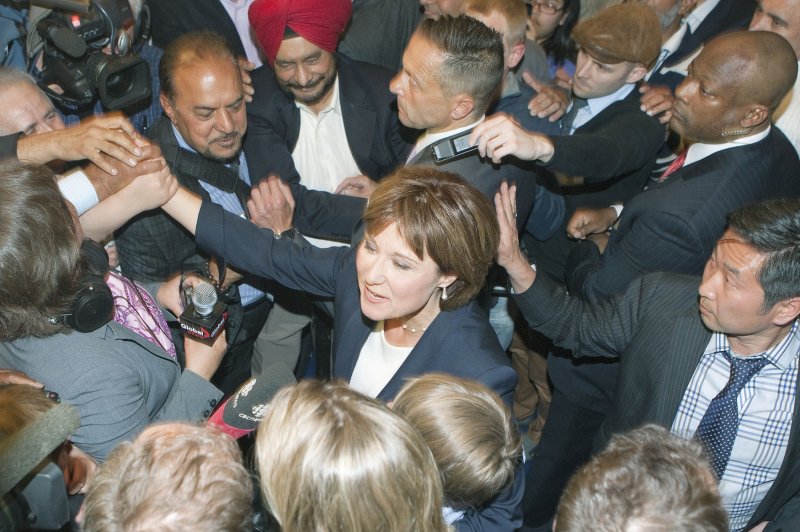British Columbia Premier Christy Clark mum on a federal report that, in more than 500 pages, said the benefits of an oil pipeline expansion project would outweigh the risks. Vancouver's mayor said the pipeline is a "bad deal." File Photo by Heinz Ruckemann/UPI |
License Photo
VANCOUVER, British Columbia, May 20 (UPI) -- Despite a report showing conventional energy could help the regional economy, Vancouver's mayor said a nod for an oil pipeline in the region is a "bad deal."
In more than 500 pages, the National Energy Board outlined its recommendations for the expansion of the Trans Mountain oil pipeline, operated by Kinder Morgan. While laying out more than 150 conditions, the NEB's provisional consent decision said there are considerable benefits "nationally, regionally and to some degree locally" that outweigh the potential risks.
Kinder Morgan was dealt a setback early this year when the provincial government of British Columbia raised questions about plans to expand the existing Trans Mountain pipeline network to triple its capacity to around 890,000 barrels of oil per day.
Vancouver Mayor Gregor Robertson said the NEB's decision was disappointing and the local opposition to the project was overwhelming.
"This proposal is a bad deal for Vancouver and our entire region," he said in a statement. "The 600 percent increase in oil tanker traffic in our local waters dramatically increases the risk of an oil spill, which would have devastating impacts on our environment and our thriving economy."
Canada relies heavily on oil and gas to fuel its economy, though Prime Minister Justin Trudeau has expressed reservations about adding pipeline infrastructure in national territory, preferring a greener agenda. In January, the NEB found Canadian oil production will remain resilient and increase by up to 56 percent from 2014 levels by 2040, but the pace of acceleration would be throttled without new pipelines.
Robertson, for his part, said Vancouver has a "green brand" that would be threatened by the pipeline. Energy plans for the western Canadian coast have riled conservation groups and members of the aboriginal community worried about the condition of the region's environment. The heavier grade of crude oil found in Canada is seen by critics as more of a threat to the environment than other types
There was no comment from British Columbia Premier Christy Clark, who in 2014 recused herself from decisions about an oil refinery planned by Pacific Future Energy Corp. Her former husband, Mark Marissen, was named executive vice president of communications at the company.
There were no published statements from Trudeau or Kinder Morgan on the NEB's decision. Margaret McCuaig-Boyd, the provincial energy minister in oil-rich Alberta, said the NEB report on the oil pipeline outlined an appropriate balance on climate issues and responsible energy development.
"Finding this balance will create jobs and economic prosperity, and help Canada overcome the current commodity price shock," she said.















